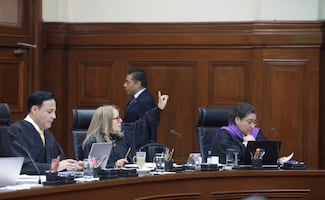Más Información

Caso Epstein: Sheinbaum reacciona sobre supuestos mexicanos mencionados; participaremos en investigación de EU si se solicita

Corte fija criterio para registrar a menores nacidos por gestación subrogada en CDMX; Batres advierte riesgos de explotación
By Giselle Rodríguez
Iranian musician Mehdi Moshtagh wanted children with special needs to feel included in life and society, so he invited children with Down syndrome to participate in a video of one of his compositions in which they would follow the rhythm with two pebbles.
The composition, entitled "De repente, resurección" (Suddenly, resurection), is one of the artist's pieces for his project Perxico, that merges Iranian and Mexican music. In the live performance for the video, Mehdi was accompanied by two Mexican musicians: Francisco Bringas, percussionist, and Carlos Pichardo, specialized in Balkan music, on the sax.

At first Mehdi tried to invite children with special needs to participate through institutions, but he failed in his attempt, so he made the invitation on his own social networks and people responded so well that he got ten children in less than five days.
The video was shot at Casa de Arte Bucareli 69 in Mexico City downtown. With the help of Casilda Madrazo, a flamenco and contemporary dancer, three girls and six boys aged between 10 and 35 opened up to the musicians and got to participate in this art project.
"I hope all people, and not only those with special needs, were as honest as these kids," Mehdi said about the experience of working with them. "When we finished shooting the video some of them hugged me and kissed me. I did not know how to react. The families were also very patient, kind and grateful," the musician added.
This is the second time he works with children with special needs; the first one was in Iguala where he worked on a documentary.
The setar player, who has been living in Mexico for five years, is participating in several other projects. He recently taught a Persian rhythm seminar and is recording a CD that will be launched in September by Abgal, a world music project led by Mexican musician José Pablo Jiménez that includes ancestral instruments such as the setar, viola, didgeridoo and Indian tabla.
His next concert is this Thursday, April 28 at 20:00 hrs. (Ciencias No. 50, Colonia Escandón), an improvisation with dancer Casilda Madrazo. On May 6 he will play in Cuernavaca with another project that merges Iranian strings with world percussions, on May 15 he will play in Texcoco with Parizad, an ensamble of Iranian and Indian music and on May 20 he plays in Chetumal with the project Ajedrez Mundo, of medieval and contemporary music, along with Mexican oud player Manuel Mejía.
He will also give two lectures this month: about the effect of the 13 modes of Persian music on the human body and Iranian ethnical groups and their music, on May 16 and 25 respectively. His wife, Ghazal Rezvani, is a painter. She has held some exhibitions in Mexico City and also gives private lessons of Persian traditional drawing.
About the similarities between Iranians and Mexicans, Mehdi says that both societies welcome foreigners and also live in a state of resistance against the things they would like to change.
He feels happy living in Mexico (so much that he would probably reject an offer to move to another country), among other things because he rarely experiences racism. That is why he felt surprised when Banco Santander canceled both, his account and the account of his wife. Days later, the bank canceled the account of other Iranian citizens.
"We were given all kinds of different explanations. I don't like to be singled out for my nationality, I don't think it is fair and this must stop because it amounts to racism," Mehdi said.
Banco Santander could not be reached for comment Wednesday morning.

Noticias según tus intereses
[Publicidad]
[Publicidad]












